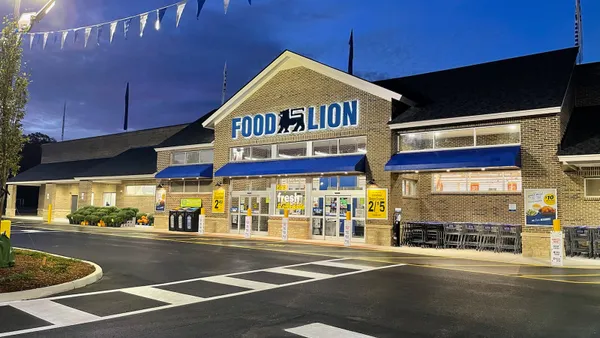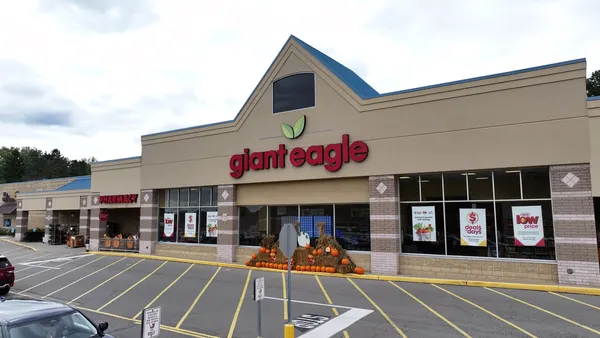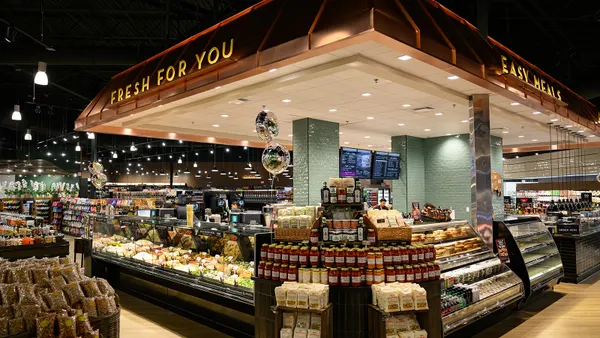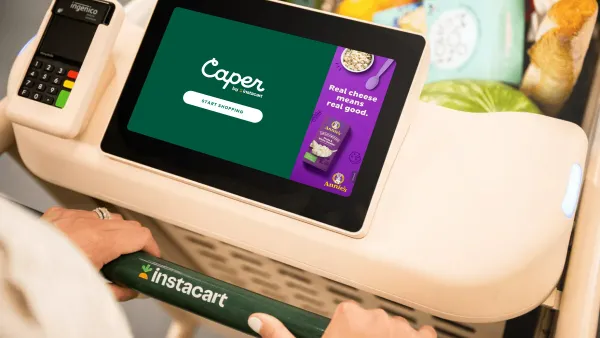Executives with Ahold Delhaize, the Dutch grocery store operator, said the company's dominance in local markets where it operates will give it a commanding advantage as Amazon, Walmart, Lidl and others battle for market share both online and in the store.
Ahold Delhaize's brands, lead by Giant, Hannaford, Stop & Shop, Food Lion and Peapod, currently hold the No. 1 or No. 2 position in 95% of the markets where it operates.
To maintain its presence and further grow its market position across its 2,000 U.S. stores, the company is investing millions to overhaul aging stores, increasing its technological presence through Peapod, robotics and data analytics and further personalizing the shopping experience for each individual region.
"All of this is focused to win in the local market place and to connect with the consumer," Kevin Holt, head of Ahold Delhaize USA, told analysts during the company's Capital Markets Day in New York. "We're really focused on growing very local brands and their market share. We believe that the local ecosystem wins."
As it looks for growth in an increasingly competitive industry, Ahold Delhaize has given its banners the autonomy to function independently, operating with a product mix and marketing strategy that meets the needs of customers in the region. It's a bold approach in an age where consolidation is growing as companies aim to save money and increase scale.
Focus on market leaders
Frans Muller, CEO of Ahold Delhaize, said the company was open to acquiring another chain or purchasing a group of stores from another grocer. The banners Ahold Delhaize would want to add to the fold are presently in the top two in their region where the company currently operates or in markets near where the Dutch supermarket chain has operations. Muller said the company could target a slight move west from where it currently has a presence.
While the grocery space has a slate of dominate players like Ahold Delhaize, Kroger, Albertsons and Walmart, along with a growing dominance by discounters and online players, the fragmented nature of the industry leaves it ripe for consolidation, especially as the need to invest in technology and an omni-channel presence comes with growing costs and complexities that can be hard for smaller plays to handle.
In areas where Ahold Delhaize operates in the U.S., more than 150 competitors exist, but only 11 have market share greater than 2%, according to the company. (Ahold Delhaize estimates its share at roughly 19%.)
“Not every player can afford these investments,” Muller told reporters. "There will be more consolidation for smaller and mid-size companies and it gives us a nice opportunity to be a part of the consolidation, to be a consolidator of choice, to gain share, to deepen our footprints and make our brands along the East Coast even bigger."
With a growing number of chains struggling to remain competitive, Muller said the grocer remains in a favorable position because of its strong balance sheet that gives it the chance to invest in technology and add to its store base when it's advantageous for the company.
"We have a very, very strong financial base. We have a super strong balance sheet. That is a very rare phenomenon. Look at Bi-Lo, look at Albertsons-Safeway, look at Shoppers, look at Tops, look at a lot of other companies and check their balance sheet," Muller said. "It creates for us optionality ... and that is quite a luxury."
Ahold Delhaize, which collects 60% of its revenue from the U.S., has been modernizing some of its stores. So far, the early results have been promising. Food Lion is benefiting from an uptick in sales following a chain-wide store update underway focusing on fresh and prepared foods.
Ahold Delhaize is hoping a refresh of its 104-year-old Stop & Shop banner will have the same effect. The company recently updated 21 stores in Hartford, Connecticut with experience-focused features like taquerias, poke bowl stations, community-table dining and an app-based checkout system. Another 60 to 80 of the banner's remaining 421 stores will be refreshed annually, the company said at the event.
As consumers purchase more groceries online, Ahold Delhaize has joined other retailers in bulking up its digital capabilities and technological advancements. It recently announced plans to test a small, automated fulfillment center in partnership with Takeoff Technologies that will use robot pickers to assemble orders at a facility attached to one of its updated Stop & Shop locations. The grocer has targeted increasing sales in the e-commerce space by 10% this year, 20% in 2019 and by 30% in two years.
A 'noticeable improvement'
The grocer appears to be doing enough to at least play defense with its more than 2,100 East Coast stores. Last week, Ahold Delhaize reported that U.S. sales rose 3% during the third quarter as the company benefited from investments in technology, stronger traffic at its stores and improvements online, where sales in the U.S. rose 11.8%.
Ioannis Pontikis, an analyst with Morningstar, said in a note that the company showed a "noticeable improvement" in the fiercely competitive Southeast market and Northeast where growth has been stagnant, as well as in its e-commerce efforts, mainly driven by improved sales trends at Peapod.
Jeff Carr, Ahold Delhaize's CFO, said so far the company has performed "very well" in markets where Lidl has entrenched itself, while the ownership of Whole Foods by Amazon hasn't diminished his company's competitiveness — though both are being closely watched.
As part of what executives called an "ambitious effort" to boost the company's e-commerce reach through its Peapod service and other initiatives, Ahold Delhaize this week announced plans to double online net sales to $7.8 billion during the next three years, while increasing its capital expenditures to 3% of sales, with $2.25 billion allocated for 2019.
The company's biggest online asset is Peapod, the leader in the online grocery delivery space that will be used as the engine behind Ahold Delhaize's own e-commerce and digital platform. This will enable Ahold Delhaize to tap into its online knowledge but allow individual brands to strengthen their own reach and establish their own identity in the local market. This is important for the supermarket operator, which found customers who engage in omnichannel shopping spend two-to-three times more than when they only shop in the store.
"We can't afford to lose the customers, it's just too expensive to try to get them back," Holt said. "As we look at the omnichannel we really do think that we'll get the ability to grow share particularly as we differentiate our brands."

Kevin Holt
CEO, Ahold Delhaize USA
By 2020, Ahold Delhaize expects about 65% of its customers to have access to same-day delivery and store pickup. In addition, click and collect will be available to additional shoppers, with the service offered to more than 600 customers in 2019 compared to roughly 250 who can currently access Peapod Pick-Up Points or at some Food Lion and Hannaford banner locations.
Muller acknowledged the company moved too slow in the past, and that 10% to 12% growth in e-commerce is "not satisfactory ... and that's why we've stepped up."
"Twenty, 30% is an ambitious target," he told reporters. "That is the right ambition for the moment, and the moment we can dial this up when we feel safe then we will do so."
Online vs. brick and mortar
Holt, head of Ahold Delhaize's U.S. division, acknowledged there will be some loss of sales at brick-and-mortar stores as e-commerce ramps up, but that the company will generate an overall increase in business that will allow it to gain market share. At Hannaford, which operates in New England and New York, he noted that if click and collect sales were removed, comparable sales at stores that had the service actually went up more than in those that didn't offer the service.
"We can't afford to lose the customers, it's just too expensive to try to get them back," Holt said. "As we look at omnichannel, we really do think that we'll get the ability to grow share particularly as we differentiate our brands."
To make it easier and more convenient for shoppers, while increasing the ability for the grocer to better target consumers and make their online shopping experience more seamless, Ahold Delhaize is working to integrate its online and in-store platforms during the pre-shop, shop and post-shop experiences. People in stores, for example, could use an app to help locate products, while online customers could choose to swap ingredients in a recipe or use a ripeness meter to find the perfect avocado or banana just as if they were in the store before getting the product delivered to their home.
"We're in a very fragmented market. We're in a very global market and as a result of that it takes a combination of fulfillment options," JJ Fleeman, president of Peapod Digital Labs, told the crowd. "We really do have a unique opportunity to test, learn and innovate. These changes will better connect all of our customers to omnichannel to expand their loyalty and share of wallet here on the East Coast."










